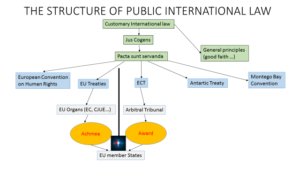On 7 May 2019, the arbitral tribunal in Eskosol S.P.A in Liquidazione v Italian Republic [1] took a position on various issues concerning ECT arbitration following the judgment of the CJEU in Slovak Republic v. Achmea (“Achmea“). The decision addressed a request filed on 4 February 2019 by the Italian Republic for an award declaring immediate termination of the ECT arbitration. Italy sought dismissal of all claims brought by Eskosol S.p.A in liquidazione based on the Declaration dated 15 January 2019 by 22 Member States of the European Union, entitled “Declaration of the Governments of Member States on the legal consequences of the judgment of Court of Justice in Achmea and on investment protection in the European Union”.
 Italy also objected to jurisdiction of the arbitral tribunal, based on the Achmea judgment, by invoking the inapplicability of the ECT to disputes between investors of one EU Member State and another EU Member State. Moreover, the European Commission filed a written submission as a non-disputing party prior to the Achmea judgment and later filed an updated submission addressing the legal consequences of the Achmea judgment on intra-EU disputes under the ECT.
Italy also objected to jurisdiction of the arbitral tribunal, based on the Achmea judgment, by invoking the inapplicability of the ECT to disputes between investors of one EU Member State and another EU Member State. Moreover, the European Commission filed a written submission as a non-disputing party prior to the Achmea judgment and later filed an updated submission addressing the legal consequences of the Achmea judgment on intra-EU disputes under the ECT.
The arbitral tribunal reached various conclusions. First, it decided that the Achmea decision does not reach the ECT,[2] second, the Achmea judgment does not preclude the tribunal from exercising jurisdiction,[3] third, the Achmea judgment does not invalidate ECT provisions because no judgment may invalidate a treaty,[4] fourth, the Achmea judgment does not retroactively invalidate consent,[5] which is especially true because the Achmea decision was rendered after both Parties had consented to arbitration,[6] fifth, the January 2019 Declarations are merely means of information of the position of EU Member States and they do not automatically terminate intra-EU BITs or the ECT, where certain procedures must be followed.[7]
The arbitrators also explained, providing the diagram above, that Achmea is irrelevant to the ECT because EU Organs and Arbitral Tribunals derive their jurisdiction separately, from different Treaties, and EU Treaties do not prevail over the ECT as a matter of public international law.
Interestingly, the Eskosol arbitral tribunal held that the January 2019 Declaration was not to be treated as a binding joint interpretation of ECT Article 26(6) on a retroactive basis. However, the question remains open as to whether the January 2019 Declaration might be treated as a binding joint interpretation of ECT Article 26(6) on a prospective basis.[8]
While the Eskosol decision is in line with the clear trend of arbitral jurisprudence asserting jurisdiction over intra-EU ECT arbitrations,[9] it sheds light on arbitral tribunals reasoning considering EU Member States Declarations, and it remains to be seen how EU Member States will implement the measures contained in their declarations, and how enforcement proceedings of such arbitral awards will evolve.
The decision is available here:ESKOSOL S.P.A. IN LIQUIDAZIONE V. ITALIAN REPUBLIC
[1] Eskosol S.P.A In Liquidazione v Italian Republic, ICSID Case No. ARB/15/50, 7 May 2019.
[2] Id. at 167.
[3] Id. at 178.
[4] Id. at 187.
[5] Id. at 199.
[6] Id. at paras. 198, 203, 206.
[7] Id. at 227.
[8] Id. at 226.
